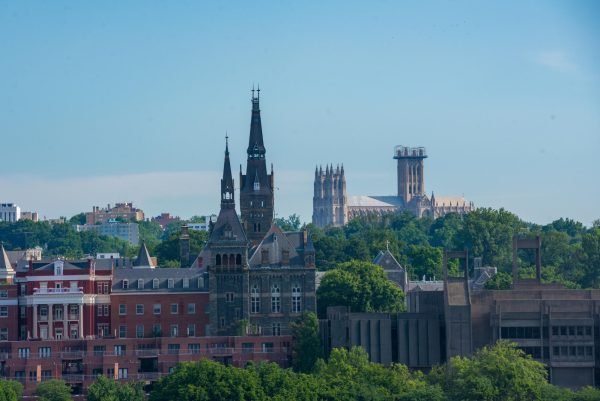A proposed bill to repeal Washington, D.C.’s self-governing status signaled concerns for Georgetown University students and District residents regarding government responsiveness to local policy issues.
The Bringing Oversight to Washington and Safety to Every Resident (BOWSER) Act, introduced by Sen. Mike Lee (R-Utah) and Rep. Andy Ogles (R-Tenn.) Feb. 6, would repeal the 1973 District of Columbia Home Rule Act, which transferred some powers originally held by the U.S. Congress to a local District government. Students at Georgetown have questioned the possible repercussions of the bill on local affairs and students’ work with the D.C. government.
The U.S. Constitution grants Congress direct oversight over all of the District’s affairs, as D.C. is the seat of the federal government. However, home rule gives the D.C. Council political authority on local matters such as state tax, the municipal budget and crime policy.
Joe Massaua (SFS ’25) said Lee’s characterization of the District as crime-ridden was neither fair to its citizens nor representative of the efforts made to reduce crime and poverty, referencing legislation such as the Secure D.C. Omnibus Amendment Act of 2024, which aimed to address increasing District crime rates.
“DC has a strong history of self-government (when permitted) and their critiques are not substantive,” Massaua wrote to The Hoya. “Ward 2 Councilmember Brooke Pinto’s SECURE DC bill made great strides, and Mayor Bowser’s investments into education, while not perfect, have cut into the root causes of poverty and crime. Of course, there is always more to do to build a safe city, but I firmly reject the notion that DC is ‘crime-ridden shambles.’”
Lawmakers included Advisory Neighborhood Commissions — a local government entity for D.C.’s neighborhoods — in the home rule charter as a means of increasing representation in the District’s governance. ANCs advise both the D.C. and federal governments on local matters, and many D.C. government agencies, such as the District Department of Transportation, are required to consider ANC guidance. If the bill to abolish home rule were to pass, it would likely abolish ANCs as well.
Massaua added that, as a former member of Georgetown’s ANC representing the Georgetown, Burleith and Hillandale neighborhoods, the possible elimination of ANCs threatens important local policy work.
“ANCs are vital for neighborhood functioning, serving the most local needs of residents from liquor licenses, sanitation, public transit and housing,” Massaua wrote. “With the potential elimination of ANCs, DC will lose a legion of hundreds of quiet unpaid public servants who care deeply about their neighborhoods.”

Maeve Kramer (CAS ’26), a D.C. resident, said eliminating the localized structures of the District’s government would decrease efficiency and progress.
“If you cut out that middleman that is suited to deal specifically with local D.C. issues, I have to imagine that would absolutely become a problem,” Kramer told The Hoya. “You wouldn’t be able to get anything done in D.C. communities because, if you had to go through the national government, they wouldn’t care. I have to imagine that would make everything slower, more bloated or just eliminate the possibility of doing anything at all.”
Ogles said the bill is necessary to address perceived problems with government corruption and crime in D.C., blaming such problems on Mayor Muriel Bowser, a Democrat, and the 13 current members of the D.C. Council, 11 of whom are also Democrats.
“The radically progressive regime of D.C. Mayor Bowser has left our nation’s Capital in crime-ridden shambles,” Ogles wrote in a Feb. 6 press release. “As such, it seems appropriate for Congress to reclaim its Constitutional authority and restore the nation’s Capital. The epicenter of not only the United States Federal Government but also the world geopolitics cannot continue to be a cesspool of Democrats’ failed policies.”
Asher Maxwell (CAS ’26) is a constituent of Ogles’ and an organizer with Hoyas Against Legacy Admissions, a student organization advocating for an end to legacy and donor preference in the university admissions process. Maxwell said Ogles’ bill wrongfully targets D.C. residents while ignoring the needs of his constituents in Tennessee.
“As a constituent of Congressman Ogles’s, let me say that the last thing the people of Middle Tennessee need is their congressman spending his time on an authoritarian takeover of a city far outside of our district,” Maxwell wrote to The Hoya. “Both DC and Tennessee would be better off if Congressman Ogles minded his own business and let DC’s citizens govern their city.”
Darius Wagner (CAS ’27) is an organizer with Hoyas Against Legacy Admissions and vice president of the Georgetown University Student Association, Georgetown’s student government. Wagner said the passage of the bill would significantly impede the organization’s work with the D.C. government to ban legacy admissions.
“Our main goals are through the D.C. City Council and through the mayor’s office, so, inevitably, it would be a significant disruption to how we’re able to achieve our goal through passing legislation,” Wagner told The Hoya. “The prospect is just daunting, but we still remain confident that, as the law exists, we can get over the finish line.”
Massaua said eliminating home rule would only increase barriers to student advocacy efforts by relegating policy decisions to Congress.
“The elimination of Home Rule will throw a wrench into student advocacy,” Massaua said. “Abolishing Home Rule is a policy that has not been well thought through, as it would add many new bureaucratic inefficiencies to an already broken institution: Congress.”
Kramer said she is unconvinced Congress would be able to address the needs of District residents.
“Congress is already busy doing nothing,” Kramer said. “I don’t understand what they would do particularly differently or better. I’ve never been convinced that the national government would be better suited to govern or have any say about individual communities in D.C.”